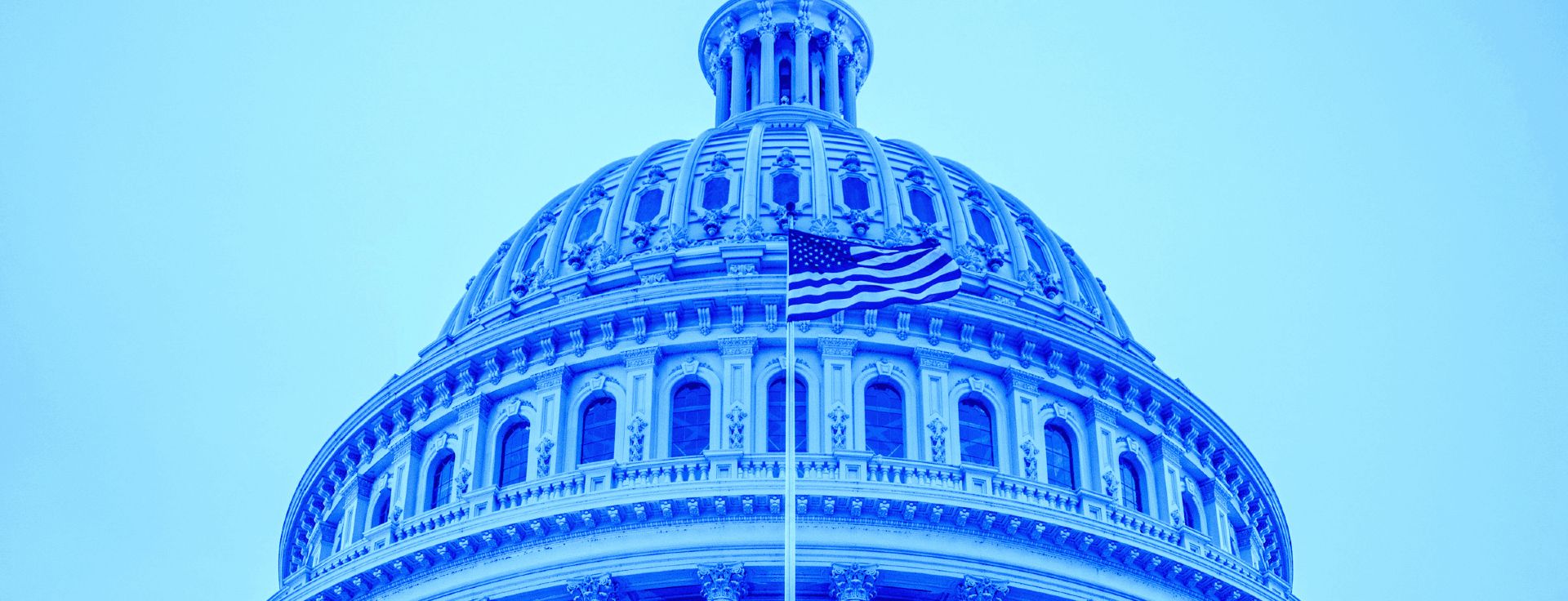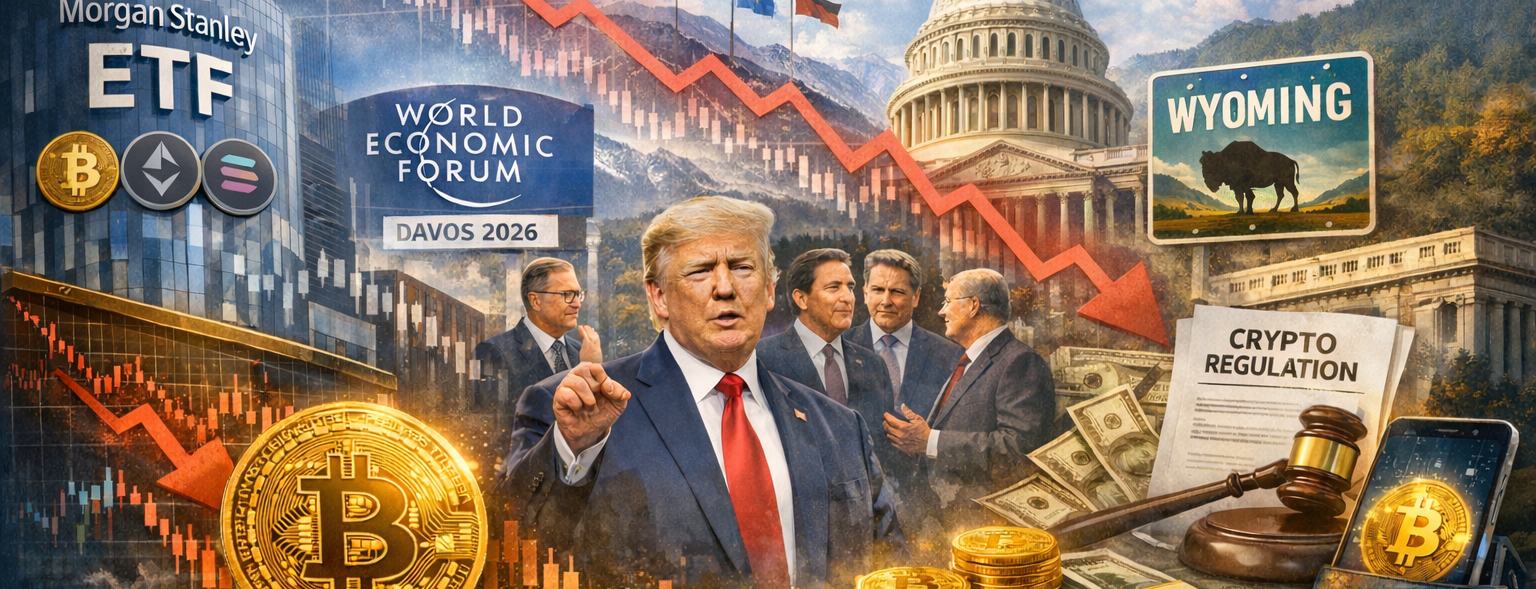
This monthly review examines the most important cryptocurrency-related news from January. The key cryptocurrency news in January revolved around Donald Trump and the new U.S. administration’s cryptocurrency actions, U.S. asset managers' activities related to cryptocurrencies, MicroStrategy increasing its bitcoin holdings, and banks’ advancements in Europe.
January in the Cryptocurrency Markets
January was a very interesting time for cryptocurrencies, as Bitcoin reached a new all-time high during the month. Additionally, there were significant differences in cryptocurrency price developments. Among the cryptocurrencies offered by Northcrypto, the best-performing ones in January were Chainlink, Litecoin, and Solana, which saw price increases of approximately 25%, 24%, and 20%, respectively. The prices of Bitcoin and Aave rose by about nine and seven percent, while Dogecoin increased by around three percent. The price of Ethereum was about one percent lower at the end of January compared to the beginning of the month, while Polygon and ApeCoin saw declines of approximately 10% and 18%, respectively.
Cryptocurrency News from the United States
The United States was at the center of attention in the cryptocurrency world, especially during the second half of January. Also, the actions of the new U.S. president, Donald Trump, and his administration were likely the most significant factors influencing cryptocurrency market price movements during the month.
Donald Trump and the New U.S. Administration’s Cryptocurrency Actions
Donald Trump, who was awaiting his inauguration on January 20, launched the Official Trump (TRUMP) meme coin on the Solana network in the early hours of January 18 (Finnish time). The market cap of Trump’s meme coin quickly surged into billions of euros, gaining widespread attention, even in traditional news media. Another meme coin associated with the Trump family also reached a multi-billion euro market cap in a short time. Just under two days after the launch of the Official Trump meme coin, Melania Trump, the new First Lady of the United States, introduced her own meme coin, Melania Meme (MELANIA).
Another interesting piece of news related to President Trump was the cryptocurrency purchases made by the Trump-backed project World Liberty Financial (WLFI) in honor of the presidential inauguration. WLFI purchased several cryptocurrencies on the Ethereum network, including Bitcoin (WBTC), Ethereum (ETH), Aave (AAVE), and Chainlink (LINK). In addition, WLFI has made multiple Ethereum purchases. By the end of January, WLFI held over €260 million worth of Ethereum (ETH and stETH) and nearly €65 million worth of Bitcoin (WBTC).
The new administration also took immediate steps regarding cryptocurrency regulation. The U.S. Securities and Exchange Commission (SEC) repealed the controversial SAB 121 rule, which had required financial institutions, such as banks, to record customers' cryptocurrencies as liabilities on their balance sheets. With the repeal of this rule, banks and other financial institutions now have significantly fewer obstacles to holding cryptocurrencies.
President Trump also fulfilled a promise in his first days in office that was met with great enthusiasm, particularly in the Bitcoin community. He pardoned Ross Ulbricht, who was serving a life sentence. Ulbricht, who had been imprisoned for over ten years, was convicted for founding Silk Road, an online marketplace launched in 2011 where it was possible to trade anonymously and use bitcoin as a payment method. Over the years, Ulbricht’s sentence had been widely criticized for its severity, and also Trump harshly condemned those who had sentenced him in his pardon statement.
U.S. Asset Managers’ Cryptocurrency Activities
The world’s third-largest asset manager, Fidelity Investments, released a report in early January covering cryptocurrency trends for 2025. The report explores various aspects of the cryptocurrency market, from Bitcoin ETFs to Ethereum scalability solutions. Perhaps the most intriguing prediction in the report is that more governmental entities are expected to increase their strategic bitcoin holdings this year. The summary of the report also presents Fidelity’s view that we are at the dawn of a new era for cryptocurrencies, which could last for years or even decades, during which cryptocurrencies will expand into multiple sectors.
Besides Fidelity, cryptocurrencies were also highlighted in connection with BlackRock, the world’s largest asset manager. Larry Fink, the CEO of BlackRock, discussed Bitcoin in an interview with Bloomberg. Fink described Bitcoin as an international safe haven against various risks and expressed strong confidence in Bitcoin’s role in this capacity. He also mentioned the possibility that sovereign wealth funds could allocate 2–5% of their assets to bitcoin, potentially driving its price to $500,000–$700,000.
MicroStrategy Increased Its Bitcoin Holdings with Multiple Purchases
As usual, U.S. company MicroStrategy was in the spotlight in January due to multiple bitcoin purchases. The company announced four separate bitcoin acquisitions during the month, purchasing approximately 24,700 bitcoins for nearly 2.5 billion euros. These acquisitions increased MicroStrategy’s bitcoin holdings to approximately 471,100 BTC, valued at around €46.5 billion at the end of January. MicroStrategy originally started acquiring bitcoin in the fall of 2020, and after its latest purchases, the company’s average purchase price per Bitcoin stands at just over €62,000.
Banking Advancements in Europe
In mid-January, it was revealed that Italy’s largest bank, Intesa Sanpaolo, had purchased bitcoin. The bank acquired 11 bitcoins for approximately one million euros, a move described as a test by CEO Carlo Messina. This was not the bank’s first venture into the cryptocurrency market, as Intesa Sanpaolo established its own cryptocurrency trading department in 2023. The banking group has over 13.5 million customers and a market cap of approximately €75 billion.
Beyond Italy, intriguing cryptocurrency-related news also emerged from the Czech Republic. In late January, the governor of the Czech National Bank (CNB), Aleš Michl, discussed the potential addition of bitcoin to the central bank’s investment portfolio. Michl expressed his goal of diversifying the portfolio and suggested that if bitcoin serves this purpose, the central bank should acquire it. Following Michl’s proposal, the CNB board plans to analyze options for investing in new asset classes.
Summary
As expected, the United States was the main focal point of the cryptocurrency world in January, following the inauguration of a crypto-friendly president and administration. The next four years are likely to be positive and interesting for cryptocurrencies and their regulatory status. President Trump and the new U.S. administration are highly supportive of DeFi, as evidenced by Trump’s meme coin launch on the Solana network and WLFI’s cryptocurrency purchases on Ethereum. Therefore, the near future appears bright for smart contract platforms like Ethereum and Solana, as well as DeFi-related cryptocurrencies such as Aave and Chainlink.
The new administration is also seen as supportive of Bitcoin, with recent discussions about a potential U.S. strategic bitcoin reserve. This could involve the U.S. adding bitcoin to its state-owned assets and possibly making bitcoin purchases. If the latter materializes, the global standing of Bitcoin would significantly strengthen. A pro-crypto administration also encourages institutional participation in the cryptocurrency market. Therefore, it can be seen quite likely that more U.S. companies will follow MicroStrategy’s example and acquire bitcoin holdings in the coming years.
Beyond the U.S., cryptocurrencies also made small advances in Europe. Intesa Sanpaolo’s bitcoin test purchase reflects banks’ growing interest in cryptocurrencies, particularly in Central and Southern Europe. On the other hand, The Czech Central Bank governor’s proposal to add bitcoin to the bank’s investment portfolio was a highly intriguing move, drawing attention even from the European Central Bank (ECB). The attitude of the ECB and European central banks towards Bitcoin and cryptocurrencies has so far been rather negative. It remains to be seen whether this proposal will spark further discussions and lead to positive governmental actions regarding cryptocurrencies in Europe.
Ville Viitaharju
Cryptocurrency specialist
Last updated: 05.02.2025 15:00




